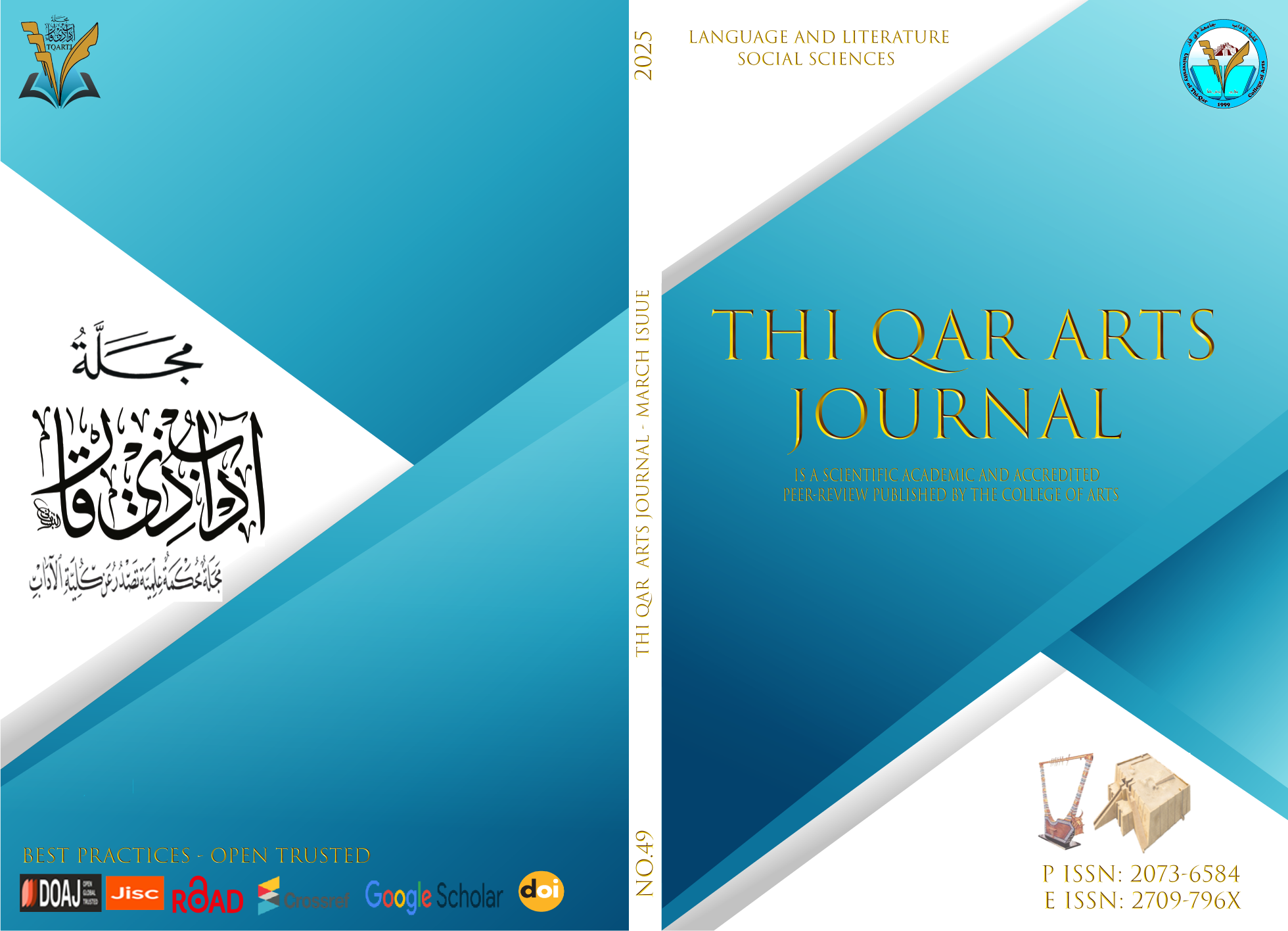The Qur'anic Context and Its Impact on Interpretation: A Methodological Review of Contemporary Exegetes
DOI:
https://doi.org/10.32792/tqartj.v2i49.753Keywords:
القرآن الكريم , السياق القرآني, المفسرون المعاصرAbstract
Studying the Qur'anic context is one of the most important methodologies used in interpreting Qur'anic texts. Understanding the context contributes to providing accurate interpretations that align with the intended meaning of the verse or surah. In this regard, contemporary exegetes focus on studying various contexts of Qur'anic texts, such as linguistic, historical, and rhetorical contexts, to achieve interpretations that reflect contemporary reality and keep pace with developments in religious understanding.
Modern studies show that context is not limited to the apparent meaning of the text but extends to include the circumstances surrounding the Qur'anic text and the developments of the era. This leads to deeper and more flexible interpretations of the texts, enhancing the understanding of Qur'anic verses in multiple temporal and spatial contexts. The Qur'anic context helps exegetes avoid partial interpretations that may deviate from the general purpose of the Qur'an.
Through a methodological review of contemporary exegetes, it can be observed that there is a variation in how context is utilized in interpreting Qur'anic verses. While some exegetes primarily focus on the linguistic context, others prefer to emphasize the historical or social context to achieve interpretations more in line with contemporary developments. There is also a modern trend towards using contemporary critical and cognitive tools to understand Qur'anic texts, such as textual analysis and contextual understanding that intersects various sciences.
Applying the contextual methodology in interpreting the Qur'an enhances our ability to understand Qur'anic texts in a more comprehensive and profound manner, helping to highlight the precise meanings and Qur'anic purposes that may be missed in superficial understanding of the texts. At the same time, this methodology forms a powerful tool for interacting with contemporary issues and the problems of the Islamic Ummah in a creative and renewed way.
Downloads
References
القرآن الكريم
1. معجم مقاييس اللغة، أحمد بن فارس بن زكريا القزويني الرازي، دار الفكر، لبنان، ط1، 1979م.
2. مفردات ألفاظ القرآن، الحسين بن محمد الراغب الأصفهاني، دار القلم، سوريا، ط1، 1992م.
3. القاموس المحيط، محمد بن يعقوب الفيروزآبادي، مؤسسة الرسالة، لبنان، ط1، 2005م.
4. أساس البلاغة، محمود بن عمر الزمخشري، دار الكتب العلمية، لبنان، ط1، 1998م.
5. البحث الدلالي عند الأصوليين، محمد يوسف حلبص، دار النهضة العربية، مصر، ط1، 1985م.
6. السياق القرآني في التفسير دراسة نظرية وتطبيقية من خلال تفسير ابن كثير، عبد الله بن محمد المطيري، دار ابن الجوزي، السعودية، ط1، 2010م.
7. نظرية السياق دراسة أصولية، نجم الدين قادر الزنكي، دار النفائس، الأردن، ط1، 2007م.
8. الكليات معجم في المصطلحات والفروق اللغوية، أيوب بن موسى الكفوي، مؤسسة الرسالة، لبنان، ط1، 1998م.
9. دلالة السياق بين التراث وعلم اللغة، عبد الفتاح البركاوي، دار النفائس، الأردن، ط1، 2003م.
10. آلاء الرحمن في تفسير القرآن، محمد جواد البلاغي، دار الهادي، لبنان، ط1، 2001م.
11. التفسير الكاشف، محمد جواد مغنية، دار العلم للملايين، لبنان، ط1، 1975م.
12. الميزان في تفسير القرآن، محمد حسين الطباطبائي، مؤسسة الأعلمي، لبنان، ط1، م1997.
13. تفسير النور، محسن بن علي نقي قراءتي، مركز الثقافة والمعارف القرآنية، إيران، ط1،م2008.
14. بحوث في علم الأصول، محمد باقر الصدر (تقريرات السيد محمود الهاشمي)، دار التعارف، لبنان، ط1، م1987.
15. دروس في علم الأصول، الحلقة الأولى، محمد باقر الصدر، دار التعارف، لبنان، ط1، 1980م.
16. جامع البيان عن تأويل آي القرآن، محمد بن جرير الطبري، دار المعرفة، لبنان، ط1، 2001م.
17. الإمام في بيان أدلة الإحكام، عبد العزيز بن عبد السلام السلمي، دار الكتب العلمية، لبنان، ط1، م1999.
18. نظرية السياق في التراث الإسلامي محاولة في البناء، محمد سالم دودو، دار الهدى، الجزائر، ط1، 2005م.
19. الأمثل في تفسير كتاب الله المنزل، ناصر مكارم الشيرازي، دار العلم، إيران، ط1، 2004م.
20. مواهب الرحمن في تفسير القرآن، عبد الأعلى السبزواري، مؤسسة المنار، إيران، ط1، 1986م.
21. تفسير القرآن العظيم، أبو الفدا إسماعيل بن كثير، دار طيبة، السعودية، ط1، 1999م.
22. لسان العرب، محمد بن مكرم بن منظور، دار صادر، لبنان، الطبعة الأولى، 2003م.
23. أيسر التفاسير لكلام العلي الكبير، أبو بكر جابر الجزائري، مكتبة العلوم والحكم، السعودية، ط1، 2009م.
24. النكت والعيون، علي بن محمد الماوردي، دار الكتب العلمية، لبنان، ط1، م1992.
25. التحرير والتنوير، محمد الطاهر بن عاشور، الدار التونسية، تونس، ط1، 1984م.
26. الترجيح بين دلالة السياق وسبب النزول، محمد أبو زيد، دار السلام، مصر، ا ط1، 2006م.
27. نظم الدرر في تناسب الآيات والسور، إبراهيم بن عمر البقاعي، دار الكتب العلمية، لبنان، ط1، م1995.
28. الأمثال في القرآن الكريم، محمد بن أبي بكر ابن القيم، دار الكتب العلمية، لبنان، ط1، 1996م.
29. النبأ العظيم، محمد عبد دراز، دار القلم، مصر، ط1، 2001م.
Published
License
Copyright (c) 2025 Fadhil Saad Jasim Abadah, Dr. Amir Ahmadnezhad, Dr.Mohammadreza Sotoudehnia

This work is licensed under a Creative Commons Attribution 4.0 International License.
The journal applies the license of CC BY (a Creative Commons Attribution International license). This license allows authors to keep ownership of the copyright of their papers. But this license permits any user to download, print out, extract, reuse, archive, and distribute the article, so long as appropriate credit is given to the authors and the source of the work. The license ensures that the article will be available as widely as possible and that the article can be included in any scientific archive.



















